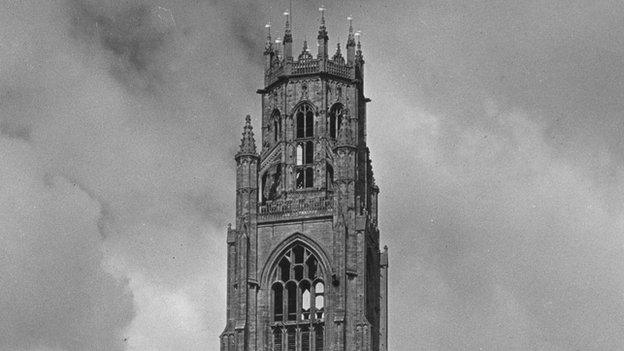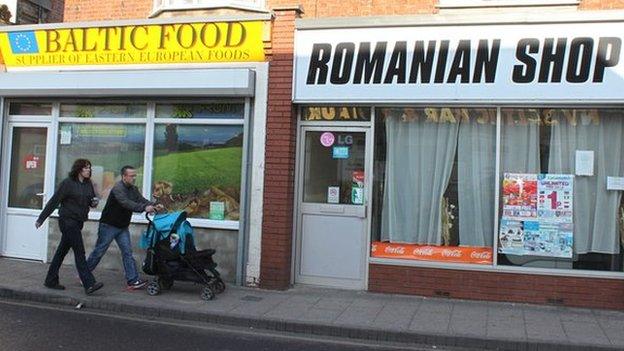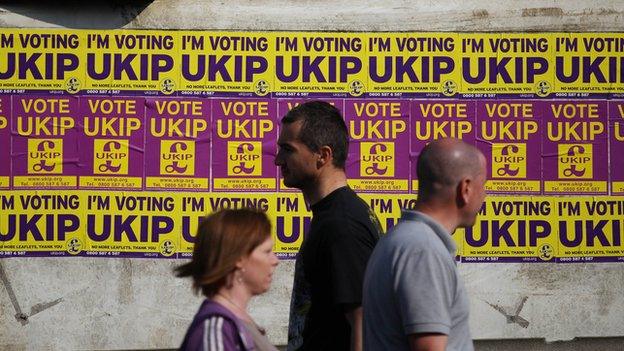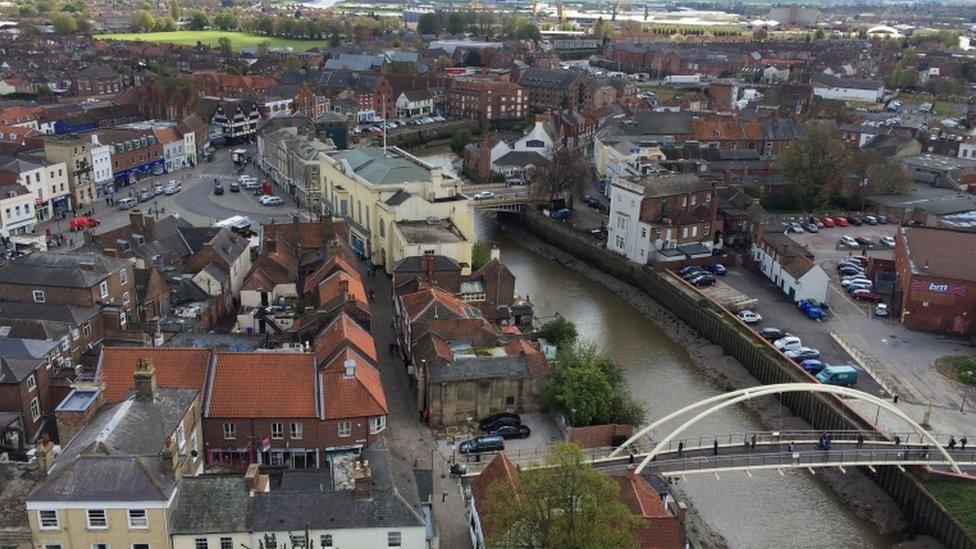How immigration changed Boston, Lincolnshire
- Published

The top of the Boston "Stump", photographed in 1930
Tuesday's Newsnight is coming from Boston, Lincolnshire. Our show will be broadcast from St Botolph's Church. Its vast tree trunk-like tower is a major landmark - known to locals, rather ungraciously, as The Stump. But, sadly, we're not there for the architecture.
Boston is one of the most extreme examples in Britain of a town affected by recent EU immigration.
The 2011 census found that around 13% of the town was born elsewhere in the EU - largely East European migrants who arrived after 2004.
Some of the effects of migration are only really observable when you go to places where the local economy has been so thoroughly transformed.
For example, the Boston story underlines the academic finding that there is no evidence that EU immigration is linked to higher unemployment, external.


Broadly, mobile people do not go where there are no good jobs. In the jargon, "displacement" is not a problem. And they will sometimes allow structural changes in the local economy that allow employment to rise. That fits the Boston story.
Unemployment in the town is well below the national average - 4.4% of economically active people, as against 5.2% nationally.

Shops in Boston reflect the cosmopolitan nature of the residents
The town is booming, despite having absorbed a huge rise in the number of potential workers in a relatively short time. These workers have also enabled an enormous change in the local economy to take place with relative ease and remarkably quickly.
Local economic transformation
Boston was a sleepy farming town. Growers used to bring in transient workers for the brief harvest periods.
Paul Gleeson, a Labour councillor in the borough, says it used to be Irish workers in previous centuries. More recently, men from local cities would arrive in white vans at 04:00, work through the morning and then disappear in the early afternoon.

More from Newsnight:

But Mr Gleeson says the local economy has diversified and now creates work all year round, which means they can sustain a lot more jobs - and so need a lot more permanent residents.
He says: "There's more harvesting going on throughout the year. And - more importantly - those vegetables are processed in Boston - wrapped and bar-coded for supermarket." Food grown elsewhere in Europe is even brought to Boston to be processed.
There are major issues, though. Nationally, economists find immigration leads to an increase in average wages. The effects, though, are not even., external

Locals pass adverts for UKIP, which has made Boston a target in recent contests
The rise is driven by the fact that people in the top half see their wages grow faster. Those at the very bottom see their wages grow more slowly. It is important to stress that these effects are very small at a national level - just a few pennies an hour either way.
Those effects, however, can be turbocharged in sectors or places where there have been major inflows. Boston is one such place: the extreme levels of immigration means the effects are all much bigger.
The town's businesses have created an unusual number of jobs and richer local people have done very well - but the squeeze on the poorer end is more extreme.
You can see that in the local pay statistics. Boston has always been a low-pay town. But it is now an exceptionally low-paid place.
The average hourly wage, external nationally is £13.33. Across the East Midlands, it is £12.26. In Boston, it is £9.13. On a weekly basis, full-time earnings are more than £100 a week less than the national average.
Congestion problems
There is also a problem with local housing. Because some workers come temporarily, they do not mind housing themselves poorly for a spell.
So 10 single workers may each pay £60 a week to share what was a three-bedroom house, netting the landlords £600 a week. That means a gross rental income from the house of perhaps £30,000 a year.
That is much more than local families can afford for those houses - and the housing supply has simply not kept up with demand.
Local rents in Boston are actually much higher than in Nottingham despite wages being lower. This is a major problem within the town and has become a major cause of frustration. People living next door to these multiple-occupied homes are also not happy.
Walking around Boston, it's also evident that it's a young place - people attracted by hard agricultural work will tend not to be older. But immigrants tend to be young anyway.

Boston is booming, despite having absorbed a huge rise in the number of potential workers in a relatively short time
According to the Annual Population Survey, more than half of the Polish-born adults living in Britain are aged 25-35. And concentrations of young people create their own issues - especially on a Friday night.
While young adults tend not to use the NHS much, they do have children. Around 11% of children born in the UK in 2014 had one parent who was an EU migrant.
Around half of those had two EU migrant parents. In Boston, the authorities have responded to a sudden rise in demand for children's services - from keeping maternity wards open through to funding more school places.
Adrian Reed, head of a local school chain, says his schools get £1,000 per head from the public purse for new arrivals with language problems.
He said: "In our trust, we have built a team of 10 people with a variety of languages - Polish, Portuguese, etc. They will be in the classroom supporting children... More importantly they support parents."
Boston has been transformed by the expansion of the European Union to the east.
The pretty little town is energetic and bustling, but is visibly not the same place as it was. A UKIP councillor Viven Edge, told us that Boston had lost some of its "Lincolnshireness".
For places like Boston, the European question is bigger than for most.
What would Brexit mean for immigration? Catch up on Newsnight's special from Boston here